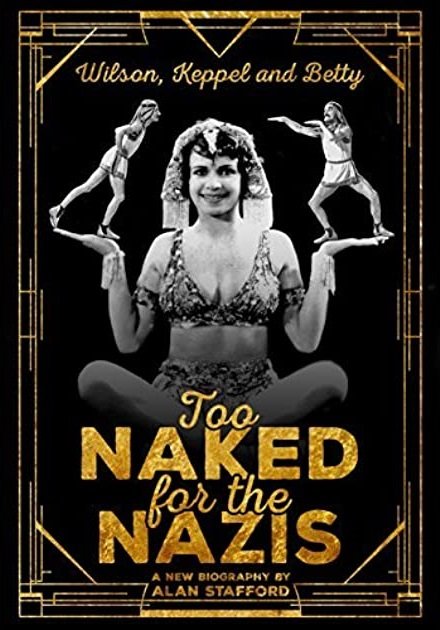I sometimes come across books through odd channels. In this instance, I read a review for a movie (I don’t even recall exactly which movie) that made a passing reference to the Sand Dance. Curious, I looked it up on Youtube, and found an intriguing video of two extremely thin men with fake moustaches in what likely would have bee described at the time as “oriental garb” doing a tap dance routine on a carpet of sand. After a bit more digging, I discovered the duo was really a trio, and that there was a book about them called Too Naked for the Nazis.
With a title like that, how could I resist?
As the full title suggests, the book tells the story of the vaudeville trio Wilson, Keppel and Betty, largely forgotten now but nearly a household name in Britain during their heyday. Wilson and Keppel began as a duo, but made an inspired addition of a talented young chorus girl named (or rather, stage named) Betty Knox. A young mother with a history as a runaway and a love of performing, Betty helped shape the act for over ten years before departing on good terms, lending her name to a host of other Bettys, including her own daughter.
The book chronicles the ups and downs of the troupe’s career, but the real star is Betty. We are treated to a description of her early life in much greater detail than Wilson or Keppel, and follow her in depth long after she leaves the trio. I can’t blame Stafford for this decision, as her life post-Wilson and Keppel was as intriguing as her life during her days with the troupe. Drawn almost by happenstance into journalism, she became a war correspondent, first known for her lighthearted articles on Anglo-American relations during the war, and later for her coverage of the Nuremburg trials, where her sense of justice for all, even former Nazis, earned recriminations from many in the press. To be clear, Betty was no Nazi sympathizer, but she felt that the trials of lower-level defendants lacked the rigor of true justice. She even claimed to have been writing a book to this effect, but the manuscript has sadly never been found, if it ever existed in the first place.
Stafford has a good, breezy writing style, unornate and clear. It reminds me of Irwin Chusid’s writing in Songs in the Key of Z: clearly the work of a devotee, but well researched and discussed without gushing. Too Naked for the Nazis provides a neat snapshot of a period in entertainment history far removed from what we have today, using one longstanding and widely celebrated act as a lens to view music hall as a whole. Recommended for anyone interested in such things.


